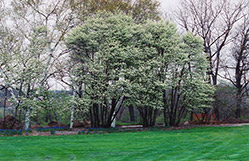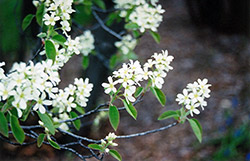Common Serviceberry
Amelanchier oblongifolia
Height: 15 feet
Spread: 10 feet
Sunlight:
![]()
![]()
Hardiness Zone: 4
Other Names: Amelanchier arborea var.arborea, Juneberry
Description:
This shrub can be considered a small tree, reaching more than 15 feet; clusters of pretty star-shaped white flowers in spring, and an ornamental value in winter as well
Ornamental Features
Common Serviceberry is primarily grown for its highly ornamental fruit. It features an abundance of magnificent deep purple berries from late spring to early summer. It features showy racemes of creamy white flowers rising above the foliage from mid to late spring before the leaves. It has forest green deciduous foliage which emerges red in spring. The oval leaves turn an outstanding yellow in the fall.
Landscape Attributes
Common Serviceberry is a multi-stemmed deciduous shrub with an upright spreading habit of growth. Its average texture blends into the landscape, but can be balanced by one or two finer or coarser trees or shrubs for an effective composition.
This is a relatively low maintenance shrub, and is best pruned in late winter once the threat of extreme cold has passed. It is a good choice for attracting birds to your yard, but is not particularly attractive to deer who tend to leave it alone in favor of tastier treats. It has no significant negative characteristics.
Common Serviceberry is recommended for the following landscape applications;
- Mass Planting
- Hedges/Screening
- General Garden Use
- Naturalizing And Woodland Gardens
Planting & Growing
Common Serviceberry will grow to be about 15 feet tall at maturity, with a spread of 10 feet. It has a low canopy with a typical clearance of 3 feet from the ground, and is suitable for planting under power lines. It grows at a medium rate, and under ideal conditions can be expected to live for 40 years or more. This is a self-pollinating variety, so it doesn't require a second plant nearby to set fruit.
This shrub does best in full sun to partial shade. It prefers to grow in average to moist conditions, and shouldn't be allowed to dry out. It is not particular as to soil type or pH. It is somewhat tolerant of urban pollution. This species is native to parts of North America.

